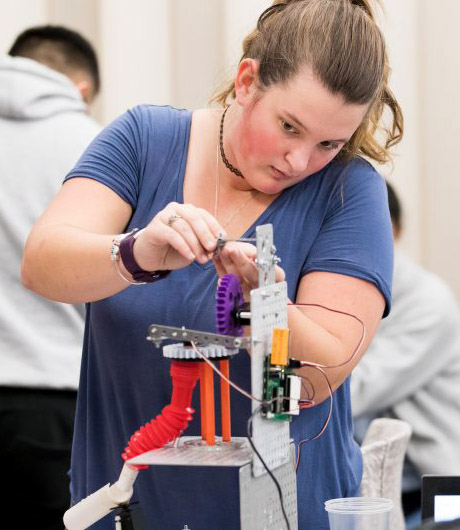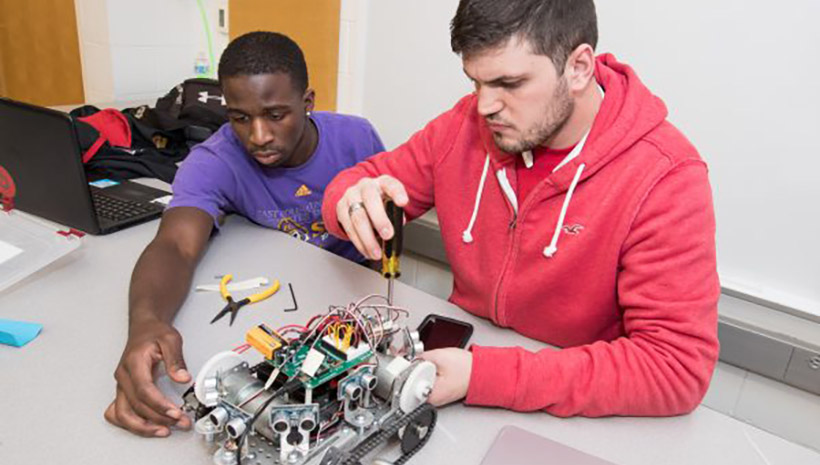REAL News for REAL People
ECU Gets $4 Million Grant to Support Engineering Students
Publisher's note: The author of this post, Ken Buday, is a contributor to ECU News Services.
East Carolina University's College of Engineering and Technology has received a $4 million grant from the National Science Foundation Scholarships in Science, Technology, Engineering and Mathematics Program (S-STEM) in an effort to support low-income students pursuing undergraduate engineering degrees.
The grant will provide scholarships to 80 students total - a cohort of 40 students beginning in the fall semester of 2020 and a cohort of 40 more in the fall of 2021. Half of each cohort will begin as freshmen at ECU, while the other half will be distributed among three community college partners - Pitt Community College in Winterville, Lenoir Community College in Kinston and Wayne Community College in Goldsboro. Those students will complete their first two years of study at their respective community colleges with the intention to transfer to ECU to complete their degrees.

"I'm incredibly excited about this award because there are such amazing opportunities to build pipelines of students into STEM degrees," said Dr. Harry Ploehn, dean of ECU's College of Engineering and Technology. "This exemplifies the kind of thing that we want to do here at ECU, to help provide the workforce for the region, to help students succeed and thrive, and to help lead regional transformation in eastern North Carolina."
The program is called Providing Inclusive Residential and Transfer Experience Scholarships (PIRATES) in Engineering. It establishes a consortium among ECU and the community colleges with the common goal of supporting low-income students not only with scholarships, but also High Impact Practices (HIPs). These include faculty interaction, mentors, tutors, job-shadow opportunities, career counseling, professional networking, extracurricular activities and team building. A research component will track the success of the program with a goal of long-term sustainability.
One of the goals of PIRATES is to contribute to the understanding of barriers that exist for low-income college students and the best practices that can be used to help students overcome those barriers.
"If you go out in eastern North Carolina, we have so many communities that have financial constraints where there are limited opportunities," said Dr. Ricky Castles, associate professor in ECU's Department of Engineering and the lead principal investigator on the grant. "We see this as an opportunity to make a financial impact on our region, to be able to enable students to attend college who may not be able to afford it otherwise. A lot of students are just not aware of the engineering opportunities that exist in eastern North Carolina or see it as a possible career path."
Another goal is to foster relationships between community college students, and university students and faculty before the CC students matriculate to ECU. The aim is to improve persistence into a four-year degree program, increase retention in both the two-year and four-year degree programs and lead to improved educational outcomes for CC transfer students.
"[PIRATES is] an articulation that aligns perfectly with PCC's efforts to make higher education accessible to all, enhance student success, and improve the experiences and outcomes of first-generation students," said Dr. Lawrence Rouse, president of Pitt Community College. "I am looking forward to seeing the results of the seamless transition this initiative creates for PCC students who transfer to East Carolina in preparation for engineering careers."
"This joint venture supports our mission of connecting hope to opportunity by supporting our students financially, allowing them to engage more in campus activities and foster better relationships with faculty and their peers through mentoring programs and collaborative advising," said Dr. Rusty Hunt, president of Lenoir Community College.
"Wayne Community College is excited to collaborate with East Carolina University to support students who want to enter engineering careers," said Dr. Patty Pfeiffer, vice president for academic and student services at Wayne Community College. "The NSF grant provides the opportunity to create a co-curricular model that can provide the support needed to help a student achieve their dreams of becoming an engineer."

Research results from the program are expected to be presented at a future American Society for Engineering Education conference.
"For the research part of it, we're studying students in general, but especially transfer students, and what that experience is like for them coming to the university and the program that is trying to support them in that transition," said Dr. Chris Venters, associate professor in the Department of Engineering and the co-principal investigator, who will lead the engineering education research piece of the project.
Castles said the goal is for the program to go beyond the life of the grant.
"This is a five-year project, but our goal with the research component is to identify needs and the best ways to support students in ways that are sustainable for a very long time in terms of helping this region and bringing in engineering students to help them learn," Castles said.
Venters said many played a role in helping ECU receive the grant, and many will also play a role in making the program successful.
"The support that we've gotten to do this has just been incredible," Venters said. "From other faculty in our department, from our industrial advisory board, it's really been a large group of people who wanted to see this happen. We're very thankful for that."
Castles said the project can change lives forever.
"We want this to have a generational transformation in their family structure," Castles said. "We've seen for years in engineering at ECU that so many of our students are the first ones in their families to go to college. They know what it means, especially when they come out after graduation and their starting salary may be more than their parents ever made in their entire lives. That changes the pathway for their family and their children, and hopefully the community as well."
Go Back
East Carolina University's College of Engineering and Technology has received a $4 million grant from the National Science Foundation Scholarships in Science, Technology, Engineering and Mathematics Program (S-STEM) in an effort to support low-income students pursuing undergraduate engineering degrees.
The grant will provide scholarships to 80 students total - a cohort of 40 students beginning in the fall semester of 2020 and a cohort of 40 more in the fall of 2021. Half of each cohort will begin as freshmen at ECU, while the other half will be distributed among three community college partners - Pitt Community College in Winterville, Lenoir Community College in Kinston and Wayne Community College in Goldsboro. Those students will complete their first two years of study at their respective community colleges with the intention to transfer to ECU to complete their degrees.

Providing Inclusive Residential and Transfer Experience Scholarships (PIRATES) in Engineering is expected to enhance student success and foster better relationships with faculty through collaborative advising. | Photos: Rhett Butler
"I'm incredibly excited about this award because there are such amazing opportunities to build pipelines of students into STEM degrees," said Dr. Harry Ploehn, dean of ECU's College of Engineering and Technology. "This exemplifies the kind of thing that we want to do here at ECU, to help provide the workforce for the region, to help students succeed and thrive, and to help lead regional transformation in eastern North Carolina."
The program is called Providing Inclusive Residential and Transfer Experience Scholarships (PIRATES) in Engineering. It establishes a consortium among ECU and the community colleges with the common goal of supporting low-income students not only with scholarships, but also High Impact Practices (HIPs). These include faculty interaction, mentors, tutors, job-shadow opportunities, career counseling, professional networking, extracurricular activities and team building. A research component will track the success of the program with a goal of long-term sustainability.
One of the goals of PIRATES is to contribute to the understanding of barriers that exist for low-income college students and the best practices that can be used to help students overcome those barriers.
"If you go out in eastern North Carolina, we have so many communities that have financial constraints where there are limited opportunities," said Dr. Ricky Castles, associate professor in ECU's Department of Engineering and the lead principal investigator on the grant. "We see this as an opportunity to make a financial impact on our region, to be able to enable students to attend college who may not be able to afford it otherwise. A lot of students are just not aware of the engineering opportunities that exist in eastern North Carolina or see it as a possible career path."
Another goal is to foster relationships between community college students, and university students and faculty before the CC students matriculate to ECU. The aim is to improve persistence into a four-year degree program, increase retention in both the two-year and four-year degree programs and lead to improved educational outcomes for CC transfer students.
"[PIRATES is] an articulation that aligns perfectly with PCC's efforts to make higher education accessible to all, enhance student success, and improve the experiences and outcomes of first-generation students," said Dr. Lawrence Rouse, president of Pitt Community College. "I am looking forward to seeing the results of the seamless transition this initiative creates for PCC students who transfer to East Carolina in preparation for engineering careers."
"This joint venture supports our mission of connecting hope to opportunity by supporting our students financially, allowing them to engage more in campus activities and foster better relationships with faculty and their peers through mentoring programs and collaborative advising," said Dr. Rusty Hunt, president of Lenoir Community College.
"Wayne Community College is excited to collaborate with East Carolina University to support students who want to enter engineering careers," said Dr. Patty Pfeiffer, vice president for academic and student services at Wayne Community College. "The NSF grant provides the opportunity to create a co-curricular model that can provide the support needed to help a student achieve their dreams of becoming an engineer."

The program is a five-year project, and the goal is to change lives, well beyond the life of the grant.
Research results from the program are expected to be presented at a future American Society for Engineering Education conference.
"For the research part of it, we're studying students in general, but especially transfer students, and what that experience is like for them coming to the university and the program that is trying to support them in that transition," said Dr. Chris Venters, associate professor in the Department of Engineering and the co-principal investigator, who will lead the engineering education research piece of the project.
Castles said the goal is for the program to go beyond the life of the grant.
"This is a five-year project, but our goal with the research component is to identify needs and the best ways to support students in ways that are sustainable for a very long time in terms of helping this region and bringing in engineering students to help them learn," Castles said.
Venters said many played a role in helping ECU receive the grant, and many will also play a role in making the program successful.
"The support that we've gotten to do this has just been incredible," Venters said. "From other faculty in our department, from our industrial advisory board, it's really been a large group of people who wanted to see this happen. We're very thankful for that."
Castles said the project can change lives forever.
"We want this to have a generational transformation in their family structure," Castles said. "We've seen for years in engineering at ECU that so many of our students are the first ones in their families to go to college. They know what it means, especially when they come out after graduation and their starting salary may be more than their parents ever made in their entire lives. That changes the pathway for their family and their children, and hopefully the community as well."






















